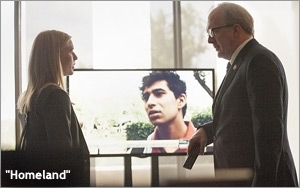
On TV, as in real life, the War on Terror is a never-ending battle.
With all due respect to the thousands of Americans working in our military and intelligence services waging
this war in the real world every day, a television viewer can be excused for experiencing battle fatigue, especially when reflecting on all the War on Terror TV shows we’ve absorbed over the
past dozen or more years.
“Homeland” is one of them, of course, and its return this past weekend on Showtime for Season No. 4 has me wondering if I have the stomach for another
go-round of this.
It’s not that there is anything particularly wrong with “Homeland.” It is a fine show with great performances in realistic settings ranging from the
Virginia suburbs of Washington, D.C. to the teeming cities of south Asia. So far this season, the cities being depicted in that region are Kabul, Afghanistan, and Islamabad, Pakistan.
advertisement
advertisement
In the
two episodes seen so far -- both of which were shown on premiere night on Sunday -- Islamabad is where the action is this season. It’s where our beleaguered heroine Carrie Mathison (Claire
Danes) is now working out of the besieged American embassy building.
The scenes set in the Pakistani capital (whether filmed there or not) are filled with the ambience we’ve come to
expect from such shows -- the streets only partially paved and strewn with trash, the crumbling curbs and buildings, the dense and haphazard traffic of two-, three-, and four-wheeled vehicles, the
swarthy populations crowding into marketplaces and bazaars.
Whether in Pakistan, Virginia or Washington, spies are everywhere. Someone is always following someone else, or preparing a
double-cross, or working at cross purposes. At the center of all the intrigue is a painstaking twofold effort aimed at identifying terror plots in their formative stages that are still preventable;
and learning the locations of wanted terrorists so they can be blasted to smithereens with guided missiles launched from unmanned drones or manned aircraft.
It’s the latter effort to
locate terrorists that forms the basis for the main storyline in the new “Homeland” season as an airstrike OK’d by Carrie leads to a missile attack on a Pakistani wedding that kills
a dozen or more innocents. The question that arises is the same one that has arisen throughout this show’s run: How will the responsibilities and stresses associated with her job affect Carrie,
who has never been quite right mentally from the get-go?
Over the last three seasons, I often wondered how on earth she remained in the employ of the Central Intelligence Agency since her
behavior has so often been irregular, to say the least. Yes, she’s been drummed into and out of the agency over the years -- but here she is again this season, very much a part of things,
in a leadership position. Go figure.
So where does the “fatigue” come from? Basically, from the intensity and the longevity of the TV version of the War on Terror. TV
viewers have been living through these fictional but realistic battles with terror cells both foreign and domestic practically since the original 9/11, starting with “24,” which premiered
on Nov. 6, 2001.
Since then, numerous terror-fighting shows have come and gone -- most of them short-lived but fundamentally the same -- all depicting government agencies and their
personnel applying high technology to tracking the movements of terrorists around the world, sometimes succeeding and sometimes not.
Extreme violence has been part of the intensity of these
shows -- something “24” became especially known for. Even more than the violence, however, is the seeming futility of the fight. As in real life, TV’s War on Terror only seems to
beget more enemies, not fewer.
And so, with so many enemies proliferating everywhere, the fictional War on Terror continues, with TV about to introduce yet another terror-fighting drama series
-- “State of Affairs” on NBC, starring Katherine Heigl as a swashbuckling CIA operative in the Carrie Mathison mold.
Coming in November, “State of Affairs” will
premiere 13 years after “24,” a long haul for any war -- whether real or fictionalized on television.